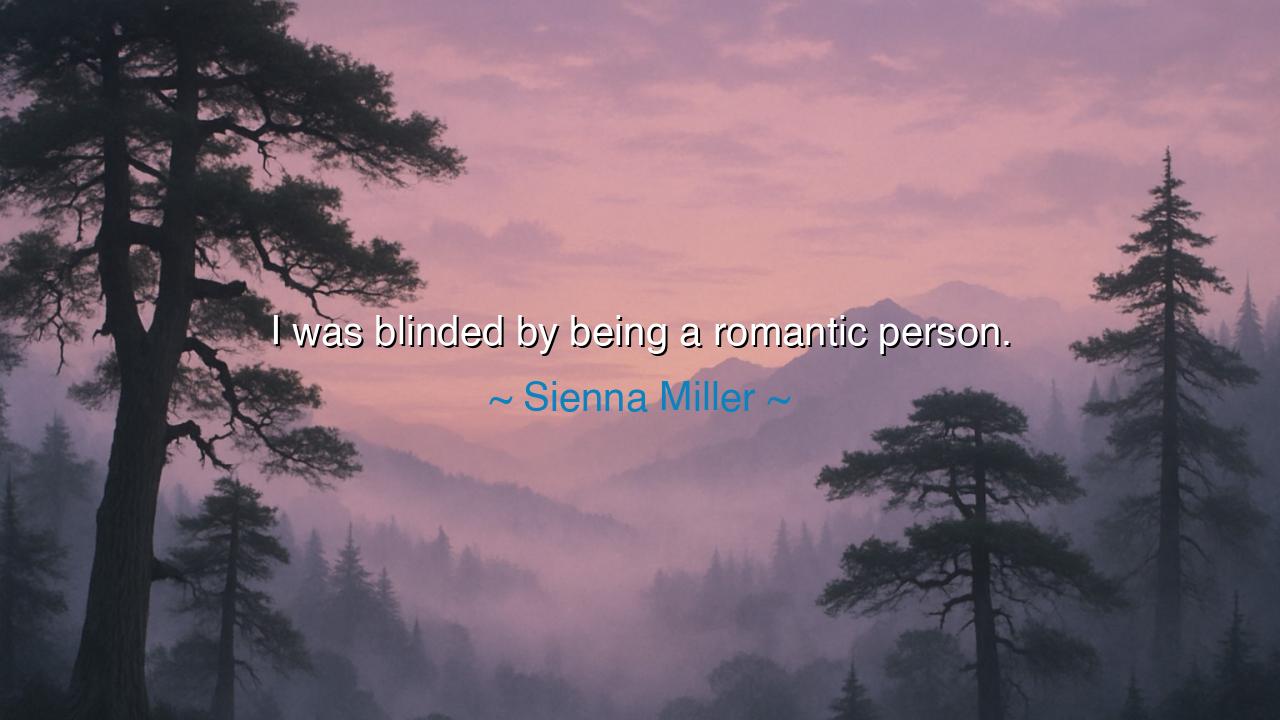
I was blinded by being a romantic person.






"I was blinded by being a romantic person." – Sienna Miller. These words echo with the lament of one who has been ensnared by the very ideals they hold dear. To be a romantic—to see the world through the lens of passion, beauty, and unrestrained idealism—can be a gift, a force that drives us toward love, creativity, and transcendent experiences. Yet, as Miller reveals, it can also be a curse, one that can cloud our judgment and cause us to overlook the harsh realities that lie beneath the surface. To be blinded by romance is to be consumed by an illusion, where the dream becomes more powerful than the waking truth.
In the ancient world, the romantics were often seen as those who transcended the ordinary, seeking out a higher truth, a deeper understanding of love and beauty. The poets of the Romantic era, like William Blake, John Keats, and Lord Byron, praised the virtues of passionate love, the transformative power of nature, and the sublime beauty of the world. Yet, even these great thinkers and creators warned of the dangers of excessive idealism. In their works, they often portrayed the tragic consequences of unbridled desire, where the pursuit of perfection led to disillusionment and suffering. To see the world only through the lens of romance is to risk ignoring its darker, more complex facets.
The blinding nature of romance is akin to the myth of Orpheus, the great poet and musician who, in his desperate love for Eurydice, tried to bring her back from the underworld. His idealistic belief in the power of love led him to ignore the warning not to look back until they reached the light of the living world. In the end, his blindness—his inability to confront the reality of his situation—led to the loss of Eurydice forever. This myth, like Miller’s quote, serves as a poignant reminder of the dangers of idealizing love, of seeing it not as it truly is but as we wish it to be. Orpheus was blinded by his own longing, much as Miller was by her romantic ideals.
Consider, too, the story of Napoleon Bonaparte, a man driven by grand ideals of empire and romantic ambition. His vision of a unified Europe, of glory and greatness, was fueled by an unwavering belief in his own destiny. Yet, this romanticism led him to overextend his reach, ignoring the practical limitations of his power and the realities of warfare. His downfall, marked by the disastrous invasion of Russia, is a historical example of how being blinded by lofty ideals can lead to catastrophic failure. Napoleon's inability to reconcile his romantic vision with the harsh realities of the world ultimately brought him to ruin.
The lesson of Miller’s words is not to abandon the ideals of romance, but to temper them with clarity and wisdom. To dream, to love, to pursue beauty and passion—these are noble endeavors, but they must be balanced with an awareness of the world as it truly is. Romanticism, when left unchecked, can become a veil that distorts our perceptions and blinds us to the complexities of reality. Just as the poet must seek the balance between imagination and truth, so too must we strive to live with our eyes open, fully aware of both the light and the darkness that define the human experience.
In our own lives, we must seek to awaken from the blindness of idealism. It is good to dream, to envision a better world or a more perfect love, but we must also recognize the limitations of our dreams and approach life with both passion and practicality. Like Marcus Aurelius, who understood that the world was filled with both beauty and suffering, we must accept that life is never just one or the other. The ideal must always be tempered by the real, and the pursuit of our deepest desires must be balanced by the wisdom of experience.
Thus, let us live with our hearts full of romance, but our minds grounded in reality. Let us embrace love, creativity, and ambition, but never at the cost of our self-awareness. In the end, it is not the pursuit of idealized dreams that leads to fulfillment, but the ability to navigate the world with both the fire of passion and the clarity of wisdom. Through this balance, we will find a richer, more meaningful life—a life where our ideals guide us, but never blind us.






AAdministratorAdministrator
Welcome, honored guests. Please leave a comment, we will respond soon